Staging the unstageable: director and cast of ‘4.48 Psychosis’ bring Sarah Kane’s work to life
Controversial for being the last play before its author’s suicide, ‘4.48 Psychosis’ will be performed at the Dreamwell Theater. The director and cast members discuss the play’s subject matter and the obstacles of bringing it on stage.
November 7, 2019
Sarah Kane’s unique and “unstageable” play 4.48 Psychosis will be coming to the Dreamwell Theater this weekend.
Considered a unique achievement in playwriting for its complicated structure, 4.48 Psychosis is a play that lacks specific characters, settings, and stage directions. It explores the dark realities of depression and flutters in and out of an abstract reality. Director and University of Iowa alumnus Eric Marlin said the production was a challenge to put on stage.
“It is an incredibly difficult play for many reasons. One, Sarah Kane’s plays demand a lot of the people creating them,” Marlin said. “They’re emotionally very difficult, often times audacious in what they ask you to put on stage. She doesn’t give you a lot of hand holds about how to go on about realizing it.”
Marlin also had to face the play’s reputation of being Kane’s final work before her suicide. He said his intention as a director was to eliminate any glorification of this element.
“I think if we’re producing the play, we have to trust it’s a real play,” Marlin said. “We’re not treating it like Sarah Kane’s personal diary. I think that’s the only responsible way to go about it. Secondly, I think it’s a bit sexist. There’s this opinion about female writers just writing about their feelings, like they don’t have control of their craft as writers. While this play clearly comes from a place of deep and personal pain for Sarah Kane, it is also an incredibly carefully rigorously piece of writing that she has control over.”
Lead actress Diviin Huff said she found common ground with her character, “She,” in the play.
“It’s challenging because the script is very poetic and it’s sad,” said Huff. “But it’s poignant and beautifully written. The character of ‘She’ is the one going through these suicidal ideations and a depressed state of mind. I can relate because I have dealt with depression in my life and I think that a lot of us have dealt with someone, if not themselves, with depression and mental illness.”
Erin Mills, who plays “The Doctor” spoke about her appeal to the material.
“I’m drawn in by these topics. I’m really curious and interested in what happens to make people feel this way,” Mills said. “It’s challenging, but very worthwhile. Everyone should know that this play doesn’t hesitate to talk honestly about Sarah Kane’s experience with depression and suicidal ideation.”
Huff said she felt moved to be chosen as the lead, since the topic of mental illness in communities of color rarely receive proper depictions.
“Because mental health is such a touchy subject, especially in communities of color, I think it was special to be chosen to be the lead of this play as a black woman,” she said. “There are social stereotypes around it. There are so many people that think you can change your outlook that quickly, but it’s a practice you have to do to get yourself out of this knot of dark thinking.”
For Huff, the story is as powerful as it is relevant.
“As a woman of color, I’m grateful for this opportunity to share this story of a woman who may have not looked like me, but someone who does look like me can see this and know that they can get through it,” she said.




